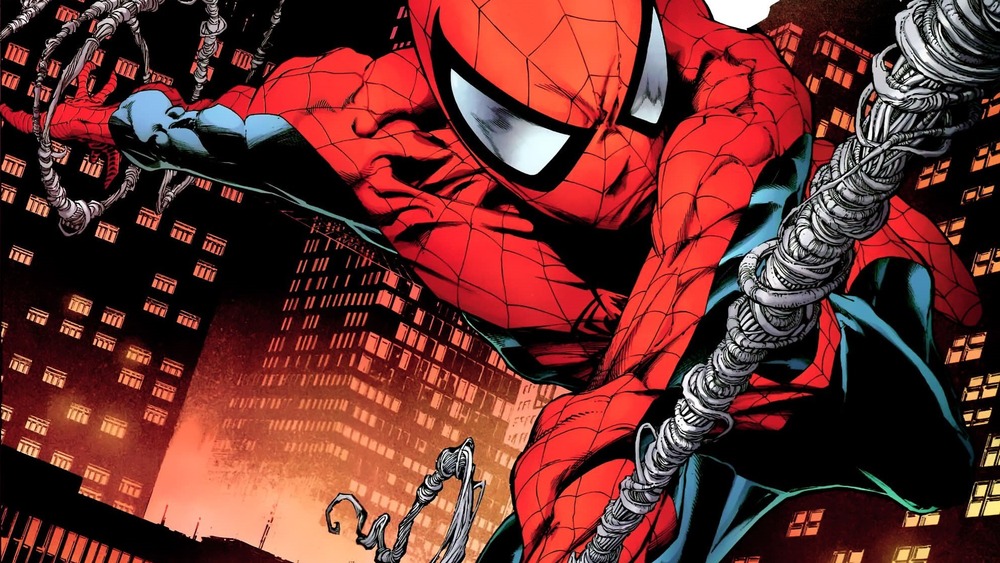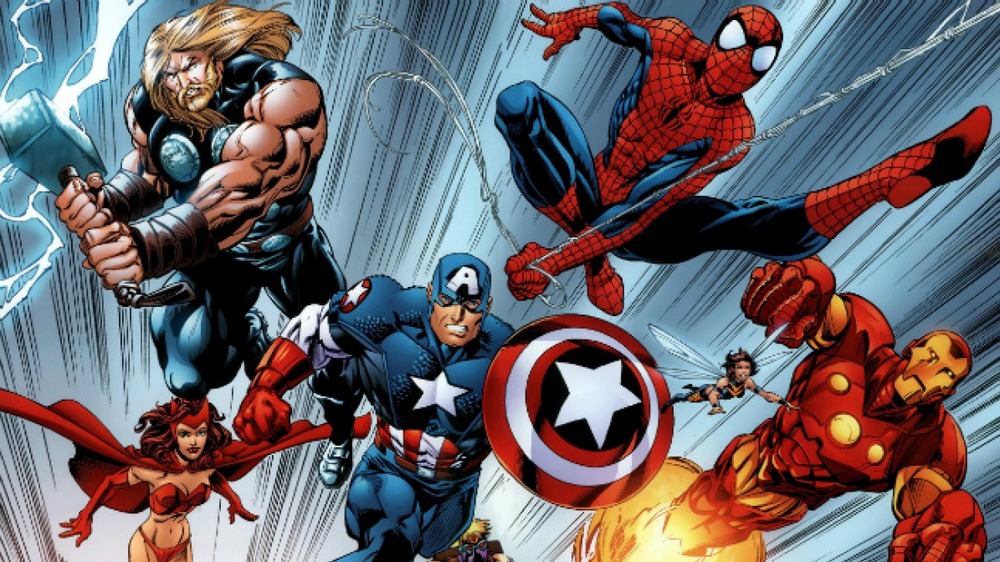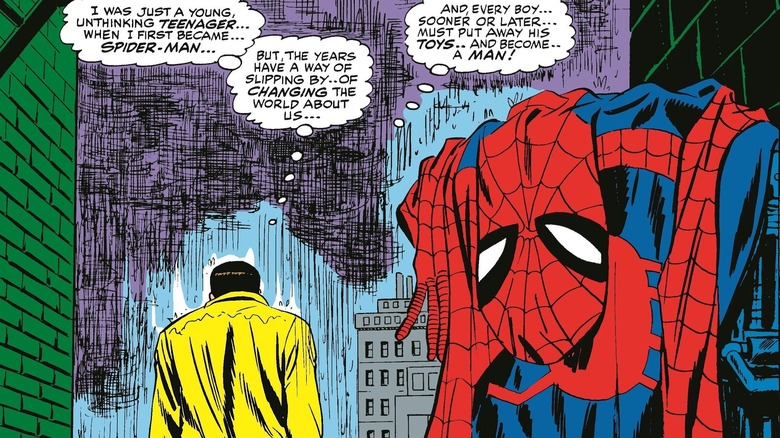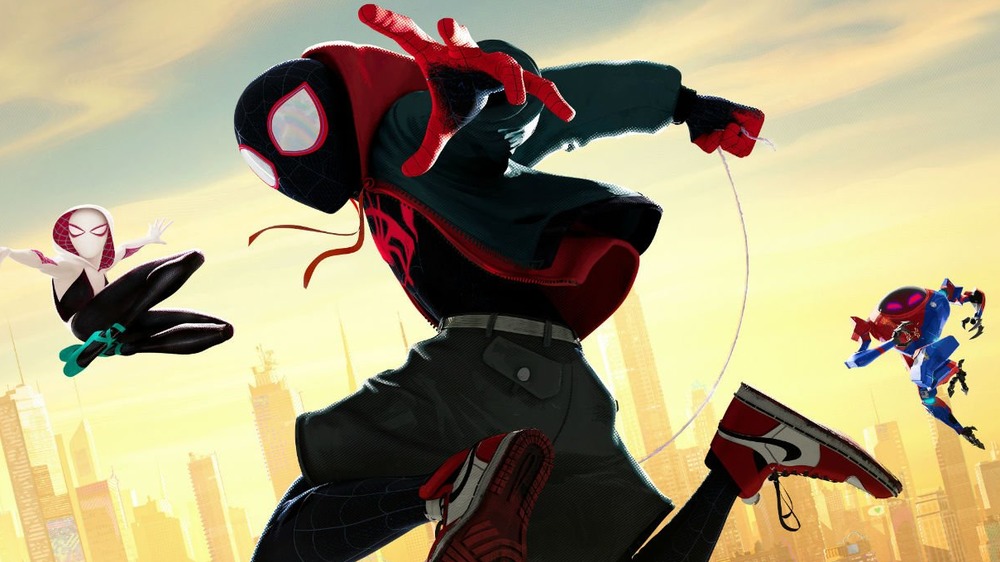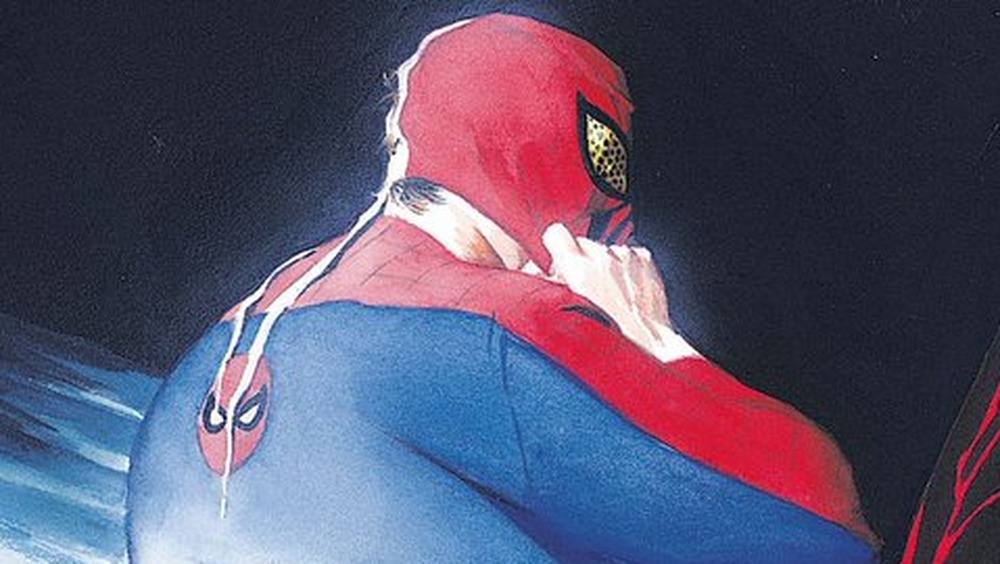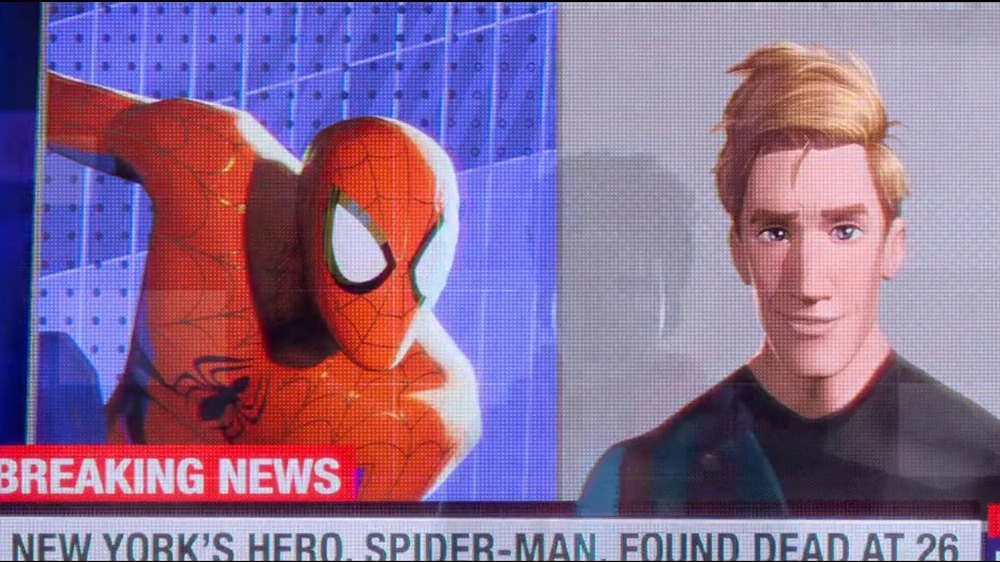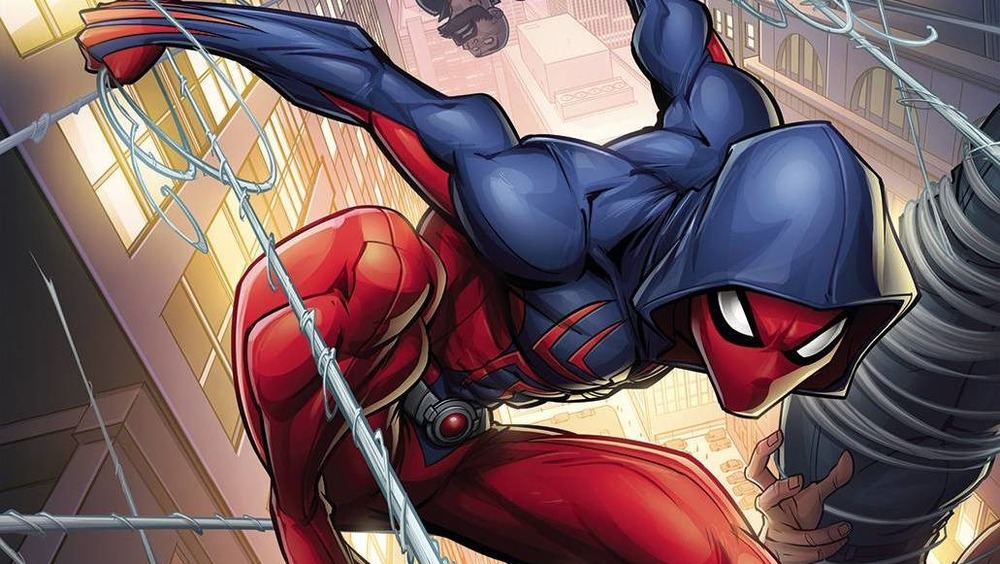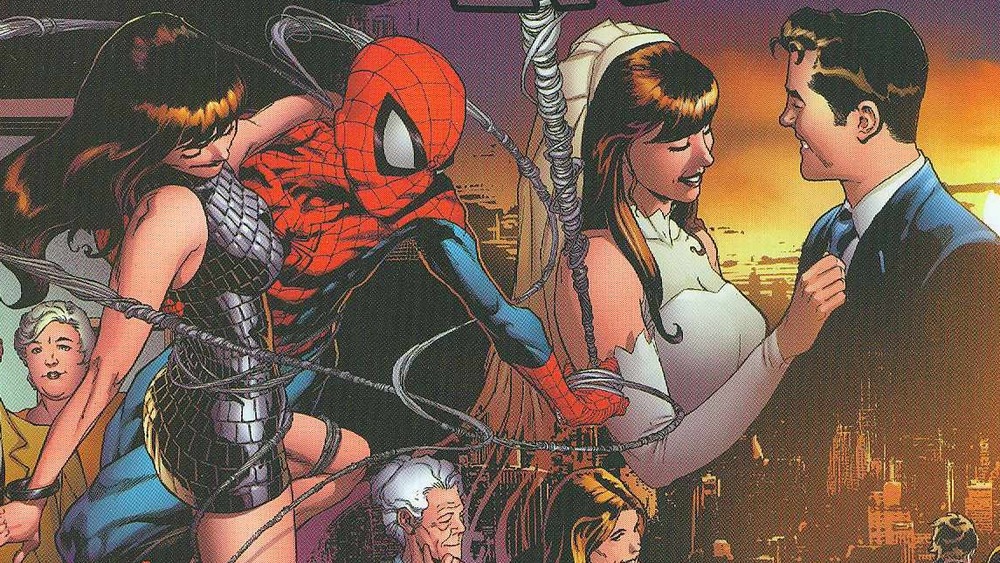Marvel Lied To You About Spider-Man
We may receive a commission on purchases made from links.
A brainchild of Steve Ditko and Stan Lee, Spider-Man first appeared in 1962 and has yet to go out of style. At all points in time since, he's been either the most popular Marvel superhero, one of the publisher and entertainment giant's most visible and profitable IPs, or the most popular superhero. He's been featured in seven live action films, with an eighth in the works, which means he's made more movies than any other costumed crimefighter except for Batman. Throw those movies on the list next to multiple animated series, the best animated superhero movie of its era, a whole bunch of video games, and of course, countless comics, and Peter Parker looks remarkably accomplished and productive for someone who, technically, doesn't exist.
But just like anyone whose actions and life events are dictated by a committee assembled in a corporate boardroom — sometimes multiple committees assembled in multiple corporate boardrooms, with conflicting interests — not everything always goes as planned for our friendly neighborhood web head. Every once in a while, his fans find themselves feeling misled. Or, if we prefer not to phrase the situation so generously, sometimes Spidey's audience gets lied to.
With that in mind, here's a compilation of some of the most egregious occasions in which the powers-that-be behind Spider-Man pointed his audience in the wrong direction.
Let's not judge Spider-Man too harshly. After all, who among us has not, at one time or another, experienced our own personal clone saga?
He was strictly a solo act...until he wasn't
In an era where the terms "Avengers" and "Marvel Superheroes" are often used interchangeably, some of us find it jarring to remember a time when the notion of Spider-Man joining the Avengers sounded nutty. But up until the beginning of New Avengers by Brian Michael Bendis and David Finch in 2005, Spider-Man considered himself something of a "lone wolf." In an oversized, annual story from 1966, Spidey deliberately botches a tryout with the team, and swings away while musing out loud, "Looks like you gents'll have to do your Avenging without me!"
Of course, it was understood by the fan base — if not necessarily stated by the company — that Marvel didn't think it made sense to dilute its most profitable brand by stretching it across multiple titles. Spider-Man and The Avengers could interact in crossover stories, but they couldn't appear in each other's books on a regular basis. That's what made the crossovers feel special.
But according to an interview with SyFy, it was actually Bendis and Mark Millar who made a case for an Avengers lineup that felt more like Marvel's answer to the original Justice League, with all the publisher's most popular characters in one ongoing series. While Spidey's Avengers membership definitely clashes with some things he says in old comics, at least this way, writers don't have to keep stumbling over themselves trying to explain why Spider-Man doesn't work with the other New York-based heroes every day.
Spider-Man: No More! really means Spider-Man: Lots More!
Spider-Man stories have generated some unforgettable images over the years. If we focus exclusively on what's come directly from the comics, it's hard to think of a panel that's been repurposed more times than Peter Parker walking away from the spider-suit in the trash, in a story titled "Spider-Man: No More!" There's a similar shot in the second Spider-Man movie directed by Sam Raimi, Spider-Man 2 (2004). The suit has found its way into the trash in at least one animated series, and even DC borrowed the idea for a Blue Beetle cover in the 1980s during the JLA's goofball phase.
But wait a sec — that panel originally appears in Amazing Spider-Man #50 (1967). There's been a lot more Spider-Man since then. We're not even sure where to start pointing out that if a person in 1967 earnestly predicted that Spider-Man was about to stop being a thing, that person either didn't know what they were talking about or was a huge liar. In fact, if you even just read that very same issue, you know Peter Parker's back in action by the end of the book. That's when he turns directly to you, the reader, and screams, "JUST KIDDING!!! I'm not going anywhere, bucko!"
Okay, we made that last part up, but we bet you understand our point....
Miles Morales doesn't go 'into' the Spider-Verse
At the risk of taking the title of a beloved movie way too literally, it is our unfortunate responsibility to point out that Miles Morales, who takes up the mantle of Spider-Man after Peter Parker dies in the line of combat, does not go into the Spider-Verse in the otherwise flawless 2018 film of that name. Miles remains in New York throughout the story, and various elements from parallel Earths cross over into the reality he already occupies. So technically, it would make a lot more sense to say the Spider-Verse comes to him.
But maybe we're thinking about this the wrong way. Perhaps the "Spider-Man" part of the title Spider-Man: Into The Spider-Verse is intended more as a category signifier than the subject, and the entity going into the Spider-Verse is us, the viewing audience. Or maybe the film itself figuratively goes into the Spider-Verse, with "goes into" loosely meaning "explores" in this context.
Technically, the title isn't a lie, but it certainly isn't as clear as it could be. Calling the movie "A film about the Spider-Verse that includes popular fantasy character Spider-Man" would have been more accurate. But then again, that's not very catchy, is it?
Does great power really come with great responsibility?
Peter Parker's origin story has been retold numerous times in several mediums, but one thing remains constant — Uncle Ben's speech about great power and great responsibility.
A master dispenser of folksy, homespun advice, Ben explains to young Peter that, well, he's a man now, and with the additional power of manhood comes the responsibility to use it for the greater good. After Peter gets spider-powers, he metaphorically sits on his hands during a chance to capture a mugger who later blows Uncle Ben's brains out. Peter remembers that if he had taken his uncle's message about power and its proportionate relationship to responsibility to heart, he might have saved his beloved old surrogate father figure's life.
However, that whole deal gets weird in the Earth X timeline as documented by Jim Kreuger, Alex Ross, and John Paul Leon in their 1999 series of the same name. Mysterious circumstances turn everyone on Earth into mutants, apparently, which means Peter Parker is no longer more powerful than the average person, and thus feels no responsibility.
In the interest of avoiding Earth X spoilers, let's say one thing leads to another which leads to yet another, and Spider-Man ends up explaining to Captain America, "It's responsibility that brings power. It's knowing what needs to be done that brings strength and courage."
After all this time, it turns out Uncle Ben was wrong as heck.
He appears to die twice in films released in 2018
Even in 2018, before anyone had seen a trailer for Spider-Man: Far From Home (2019), no one with any sense believed Spider-Man would remain indefinitely dusted following the events of Avengers: Infinity War. And it's probably not too much of a stretch to suggest that upon first viewing, much of the audience had doubts about the permanence of Peter Parker's exit from Into The Spider-Verse at the end of the first act.
But even if it technically counts as a lie, dying and coming back isn't a huge deal, because every superhero does that.
It's the circumstances and timing that make these two particular deaths significant. Think about it — How many fictional characters have died in movies? Plenty. But how many characters can we say die in multiple films with unrelated continuity? For the most part, that's only Shakespearean types like Hamlet, Lady Macbeth, Romeo and Juliet, who are all more or less required to not survive their respective stories.
Now, who else aside from Peter Parker dies in two movies with unrelated continuity that came out during the same year? Nobody, that's who.
In this category, our web-headed do-gooder stands utterly alone. And that's probably for the best, because it would be weird if characters getting killed twice in different movies that came out back-to-back became a regular thing.
Ben Reilly and his whole deal is a merciless lie
A lot of weird stuff happened in superhero comics during the mid-'90s. Onslaught — who is a combination of Magneto and Professor X, except there's a convoluted explanation why he isn't that at all — killed the Avengers and the Fantastic Four, but they all got better and now that whole crossover's coming back, although we still have no idea what form the new "Heroes Reborn" arc will take.
Not coincidentally around the same time, Marvel told us Peter Parker had been swapped with a clone of himself in a Gerry Conway story from 20 years earlier. The original Peter Parker, and therefore the original Spider-Man, had been living under the alias Ben Reilly all this time.
Of course we eventually found out that this was all complete bunk, but that didn't bother us so much. While putting together the Scarlet Spider costume certainly took some design savvy on Reilly's part, slick fashion sensibility alone couldn't enough to convince us he was the original Peter Parker. And why would Marvel permanently replace one of its most entrenched characters with a different guy with the same appearance, pretty much the same personality, but a different name? They wouldn't, and they didn't.
Because popular culture requires the recycling of every idea — even the bad ones — clones in Spider-Man comics are coming back. But whether Miles Morales's clone saga will bear a resemblance to the original clone saga remains to be seen.
One More Day didn't really undo Peter Parker and Mary Jane Watson
Marvel tends to market Spider-Man to younger audiences, which means in many ways, he can't ever grow up. Evidently, some individuals with influence over Spider-Man-related matters subscribe to the mindset that once Peter Parker gets too deep into his 30s, it's time to reboot him as a teenager again.
That's basically why Marvel decided Peter and Mary Jane Watson had to end their marriage, which began during the real world year of 1987. In order for Spidey to remain relatable to children, he cannot live with a spouse, as adults frequently do. He must live with a much older relative, as is typical of children.
So where's the lie? Well, when Mephisto waves the Parker-Watson marriage out of existence in the "One More Day" storyline, he also erases the world's recently-gained knowledge of Spider-Man's secret identity. So we could argue that having Spidey out himself in the comics version of Civil War, only to retcon that development less than a year later, stands as a major switcheroo.
But even if this notion was never stated explicitly, the mere implication that things were over between Peter and MJ was a bald-faced, absurd lie, which could not be told by a human being unless his or her pants were ablaze with the fires of hell. They're officially unmarried in the comics, last we checked, but course Spider-Man and MJ end up back together.
His song says he 'does whatever a spider can' but he doesn't
In another instance of Spider-Man surpassing all other heroes aside from Batman (who always wins), the Ramones recording of his 1960s cartoon theme is likely the most widely-recognizable superhero-based song, not counting the intro music from the Adam West show of the same era. But upon a close listen to the track penned by Robert Harris and Paul Francis Webster, not everything about the lyrics adds up.
"Spider-Man, Spider-Man, does whatever a spider can," sings Joey Ramone over a typically blistering instrumental by the rest of the group.
Hold on.
Spiders lay eggs. Spiders eat flies. Spider-Man does not do either of those things. And he can't spin a web of any size. His mastery of the web-spinning arts surely leaves him with plenty of range, but there are obviously limits for how small or large his webs can possibly get.
Admittedly, most of the song rings true. Spider-Man does catch thieves in a manner relatively similar to a typical spider's hunting methods, he swings from threads on a routine basis, and he generally arrives at the scene of the crime just in time. But anyone who takes the song completely literally will walk off with some profoundly confused notions about Spider-Man.
